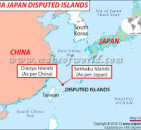This is one of the major disputes that worsen the Sino-Japan relations by claiming that Diaoyu Island (Chinese) and Senkaku Island (Japannese) is under their territorial sovereignty.
In the late 1960s, after a committee member of the United Nations announced that the vicinity of the islands was possibly rich in oil and natural gas, Japan immediately took unilateral actions.
Both Beijing and Tokyo argue with the evidences of the history, international law and treaty.
Chinese Side:
The Cairo Declaration(1943) stated that "all the territories Japan has stolen from the Chinese, such as Manchuria, Formosa (Taiwan) and the Pescadores, shall be restored to the Republic of China. Japan will also be expelled from all other territories which she has taken by violence and greed."
the Potsdam Proclamation(1945) stated in Article 8: "The terms of the Cairo Declaration shall be carried out and Japanese sovereignty shall be limited to the islands of Honshu, Hokkaido, Kyushu, Shikoku and such minor islands as we determine."
Japanese Side:
Treaty of Shimonoseki (1895) stated that Qing government should cede to Japan "the island of Formosa (Taiwan), together with all islands appertaining or belonging to the said island of Formosa after the Sino-Japanese War.
San Francisco Peace Treaty (1952) placed the Senkaku Islands under the administration of the United States as part of Okinawa, thereby reaffirming the islands' status as part of Japanese territory after the World War 2.
- Μέρος του λόγου: proper noun
- Κλάδος/Τομέας: Politics
- Category: International politics
Other terms in this blossary
Δημιουργός
- HOSEOKNAM
- 100% positive feedback
(Beijing, China)






